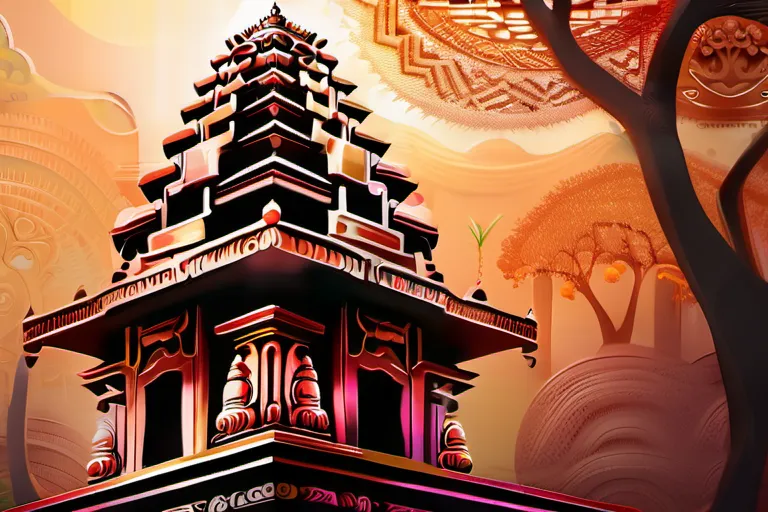Explore the fundamental concept of dharma in Hinduism, its origins, principles, and significance.
Dive deep into the rich tapestry of Hinduism as we delve into one of its most essential concepts: Dharma. This article will provide a comprehensive understanding of this ancient philosophy, tracing its roots, exploring its principles, and examining its role in modern society.
The Roots of Dharma
How did dharma, the very foundation of Hinduism, come to be? Its roots trace back to ancient Vedic texts where it was first mentioned as a set of duties and obligations that one must adhere to in order to live a righteous life. Imagine dharma as a tree, with its trunk planted firmly in the soil of these early scriptures.
The Rigveda, one of the oldest religious texts in the world, outlines some basic principles but leaves much for interpretation. As time passed, dharma evolved, growing branches and leaves that represented diverse schools of thought and philosophies. The Bhagavad Gita, a famous text within the epic Mahabharata, further elaborated on dharma through its dialogues between Arjuna and Krishna, making it more relatable and practical for everyday life.
From the Upanishads to the Dharmashastras, each layer of these texts added depth to dharma, weaving a tapestry that is both complex and multifaceted. It’s like looking at an old family tree—each branch represents a different aspect or interpretation of dharma, but they all stem from the same original trunk.
Throughout history, as Hinduism spread across India and beyond, dharma adapted to local customs and beliefs while maintaining its core principles. This adaptability is what makes it such an enduring concept in Indian culture and spirituality, serving not just as a moral compass but also as a unifying force that connects people through shared values and practices.
As we delve deeper into the principles of dharma, remember that its journey from those early texts to the present day is a testament to its resilience and relevance. It’s more than just a set of rules; it’s a way of life, a path that guides individuals towards a meaningful existence.
Principles of Dharma
Now, let’s dive into the core principles that underpin dharma. In Hinduism, dharma isn’t just a concept; it’s a fundamental way of living that guides individuals and societies towards righteousness and harmony. The four main principles of dharma—righteousness, duty, morality, and natural law—are like the cardinal directions that navigate life’s vast seas.
Righteousness, or duty, is often seen as the cornerstone, guiding individuals to act in accordance with what’s right. It’s not just about personal gain but about contributing positively to society. Think of righteousness as a lighthouse; it illuminates the path towards moral clarity and helps us see where we should be heading.
Duty (also karma) encompasses the responsibilities one has in life, whether towards family, community, or even the environment. Just as a gardener tends to their plants, fulfilling one’s duties ensures that the garden of society thrives. Every individual has unique roles and tasks, and understanding these roles is crucial for a balanced and harmonious existence.
Morality involves adhering to ethical standards and values. It’s like having a compass that points towards honesty, compassion, and respect for others. Morality ensures that we navigate life with integrity, making decisions that benefit not just ourselves but the collective whole.
Natural law, or dharma as an inherent aspect of the universe, suggests that there are universal principles governing behavior and conduct. It’s akin to the laws of nature; just as gravity dictates how objects move, dharma guides human behavior in a way that ensures cosmic order.
These principles work together like pieces of a puzzle, each fitting seamlessly into the larger picture of a life well-lived. By integrating these values into daily life, one can experience peace and fulfillment, much like navigating through calm waters rather than turbulent ones. Understanding dharma isn’t just about following rules; it’s about living with purpose and meaning.
Dharma in Daily Life
Imagine a life where every action, thought, and word is guided by a set of unwavering principles that shape not just your personal journey but also the fabric of society at large. That’s precisely what dharma in Hinduism represents. It’s like having a map for life, a beacon to navigate through the complexities of existence. But how does this ancient concept influence daily life? How do Hindus integrate dharma into their routines and responsibilities?
Dharma is not just about following rules or rituals; it’s about understanding one’s role in the world and performing actions that are in harmony with cosmic order. For a Hindu, every morning begins with an introspection of dharma. From waking up to sleeping, each moment holds significance. What you eat, how you treat others, even your profession—all must be aligned with dharma.
Take the case of a farmer who dedicates his life to cultivating the land. His duty is not just to grow crops but also to ensure he does so in a way that respects nature and supports his family. This balance between personal goals and societal duties is where dharma truly shines. It’s like playing an intricate game of chess, where each move affects both your position and the overall board.
Moreover, dharma guides social structures as well. In families, it promotes respect for elders, love for siblings, and care for dependents. In communities, it fosters cooperation, justice, and harmony. These principles are woven into every aspect of life, making sure that individual actions contribute positively to the collective good.
So, how do you find your own path of dharma? It starts with understanding who you are in relation to others and the world around you. Just as a tree finds its place in nature by growing towards the sunlight, each person must discover their purpose and align it with the principles of dharma. This journey is not always easy, but it’s essential for finding true fulfillment and balance.
The Role of Dharma in Hindu Philosophy
Imagine dharma as the invisible thread that weaves through the fabric of Hindu philosophy, holding it together and giving it its distinctive pattern. In this broader context, what role does dharma play? Is it merely a set of rules or duties that one must follow, or is it something much more profound?
Dharma is deeply intertwined with concepts like karma and moksha. Just as the roots of a tree support its growth and development, dharma serves as the foundation upon which one’s actions are built. In Hindu philosophy, these three concepts form an intricate web that guides individuals towards spiritual enlightenment.
Karma dictates the consequences of our actions, influencing not just this life but future ones too. Moksha represents liberation from the cycle of rebirth and suffering. But without dharma, navigating this complex path would be like trying to cross a tumultuous river with no map or guide. Dharma provides direction, helping us understand what is right and wrong, good and bad in our actions.
Consider for a moment: how do these concepts work together? If karma is the result of our actions, dharma sets the stage by defining the appropriate actions one should take. And when dharma leads to virtuous deeds, it paves the way towards moksha, offering a chance at spiritual liberation. Each concept complements the others, creating a holistic framework for living a meaningful life.
So, in this vast and multifaceted philosophy, dharma is not just a duty; it’s a path to understanding our true nature and purpose. It guides us through the complexities of life, reminding us that every action has a consequence and that we are all part of something greater than ourselves.
Dharma in Modern Society
How does dharma, the ancient concept from Hinduism, find its place in our modern, fast-paced world? Is it just a relic of the past, or does it hold any relevance for us today?
In the bustling streets of contemporary cities, where people rush to meet deadlines and fulfill their desires, dharma offers a different perspective. It suggests that every action has an ethical dimension—something we often overlook in our pursuit of success.
- Imagine a tree with deep roots. Just as this tree needs stable foundations to thrive, individuals need dharma for a balanced and fulfilling life. Without it, our lives might become shallow and unsustainable.
The principles of dharma, which emphasize righteousness, duty, and moral responsibility, provide a framework that can guide us through the complexities of modern living. In a society where consumerism often overshadows ethical considerations, dharma reminds us to consider our actions beyond personal gain.
How do these ancient principles manifest in contemporary practices? Consider the workplace: Can businesses operate ethically while still making profits? Can technology companies prioritize user privacy over data monetization?
- Can we find a balance between the demands of modernity and the timeless wisdom of dharma? Perhaps, by integrating these principles into our daily lives, we can create a more harmonious and sustainable society.
In personal beliefs, dharma encourages introspection and self-reflection. It prompts us to ask: Are my actions aligned with what is right? Is the path I choose in life guided by principles that benefit not only myself but also those around me?
The impact of dharma on cultural practices is profound, too. From family values and community service to festivals and rituals, these traditions are rooted in the very essence of dharma. They remind us of our interconnectedness and the importance of living in harmony with others.
In conclusion, while the concept of dharma may seem abstract or outdated, its relevance is undeniable. It challenges us to live with purpose, ethics, and responsibility—qualities that are more important than ever in today’s world. By embracing dharma, we can navigate our way through modern society with wisdom and integrity.
So, how do you incorporate the principles of dharma into your daily life? What actions can you take to live a more ethical and fulfilling existence?
The Legacy of Dharma
The legacy of dharma, like a river flowing through time, continues to shape our understanding of right and wrong, influencing not only Hindu thought but also other religions and philosophies around the world. Could it be that dharma, in its essence, is more than just a set of rules or norms? Is it a deeper, almost intuitive way of living that resonates across cultures?
Consider for a moment how dharma has influenced Buddhism, with its own version of the path to enlightenment often seen as an extension of the Hindu concept. Could it be that both paths share a common root, seeking not just personal salvation but also a broader sense of moral and ethical living? And what about Jainism, which too delves into the complexities of dharma, emphasizing non-violence and truthfulness in its core teachings?
The influence of dharma extends beyond religious boundaries. In contemporary thought, philosophers and ethicists often draw upon dharma to explore concepts like justice, duty, and the nature of the self. Can we find answers to modern ethical dilemmas by delving into the rich tapestry of dharma’s principles? Perhaps the very essence of dharma—its focus on balance and righteousness—holds keys that are universally applicable.
Moreover, in today’s world, where globalization brings together diverse cultures, could dharma serve as a bridge, fostering understanding and mutual respect among different communities? By embracing the principles of dharma, we might find common ground amidst our differences, promoting harmony and peace. Is it possible that this ancient wisdom holds the potential to guide us towards a more cohesive global society?
In essence, the legacy of dharma is not just about its historical importance but also about its timeless relevance. As we navigate the complexities of modern life, could it be that dharma offers a map, guiding us through the moral and ethical challenges we face? The journey through this path may be long, but the rewards are invaluable—guidance in our daily lives and a deeper understanding of ourselves and the world around us.
Conclusion
 By the end of this article, you’ll have gained valuable insights into the concept of dharma in Hinduism. You’ll understand its significance, how it shapes daily life for Hindus, and why it remains a vital part of Hindu philosophy today.
By the end of this article, you’ll have gained valuable insights into the concept of dharma in Hinduism. You’ll understand its significance, how it shapes daily life for Hindus, and why it remains a vital part of Hindu philosophy today.











